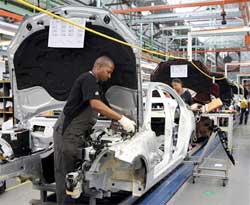Manufacturing production rebounded unexpectedly in June, though economists warn that weak demand, high administered costs, disruptions from strikes and electricity-supply shortages will keep output growth and job creation modest.

The effects of the strikes in July have hurt the SA manufacturing sector but the impact of the strikes has yet to be measured in economic terms. Image:
SA Car FanThe effects of a five-month platinum mine strike on manufacturing production are still being felt, while those of an almost four-week strike at steel and engineering firms are yet to be measured.
A business confidence index showed that confidence plummeted to an almost 15-year low last month.
Manufacturing output rose 0.5% in June compared with June last year, after contracting 3.8% in May and 1.9% in April, data from Statistics SA showed.
The 0.5% rise was supported by higher production in the petroleum, chemical products, rubber and plastic products; and food and beverages production.
The weak output, however, still suggests muted economic growth in the second quarter given that manufacturing is the economy's second-biggest sector.
Key indicators don't yet show impact of strikes

Economist Manisha Morar believes that strike, electricity costs and fuel prices will weigh down the manufacturing sector. Image: LinkedIn
A key indicator of activity in the sector is also pointing to weak output last month. The Kagiso purchasing managers' index has been below 50 for four consecutive months - indicating muted manufacturing activity.
The strike by steel and engineering industry workers led several vehicle manufacturers to constrain their production due to supply shortages.
When the July manufacturing production data is released it is likely that the performance of sectors such as motor vehicles, parts and accessories and other transport equipment could again disappoint. This division fell 11.3% year on year in June shaving 1.1 percentage points off output.
ETM Analytics Economist Manisha Morar said that challenges such as strikes, electricity-supply constraints and high electricity and fuel prices, would weigh on growth in the manufacturing sector.
"We still see prospects into the third quarter being slim given the lagged effect of the platinum mines strike as well as the impact of strike action in steel and engineering," she said.
Barclays Africa economists said they expected a "gradual recovery" in manufacturing, supported by exports to other African countries and the "competitive exchange rate".
They added that weak domestic demand and continuing electricity constraints would most likely keep the recovery in the manufacturing sector modest.

Sacci's Economist Richard Downing says he thinks there will be an improvement in business sentiment in the coming months. Image: YouTube
Weaker rand
Morar did not expect a weaker rand to have a "significant" effect on manufacturing because it inflates the cost of imported goods used in the production process.
The weak rand benefits producers through higher export earnings, but it also raises the cost of imported commodities needed in the production process.
Data also showed that manufacturing production contracted in the second quarter, implying that its contribution to second-quarter economic growth would again be poor after a disappointing first-quarter contribution.
It was not surprising that manufacturing output, import volumes and building activity were among the main factors that led to the decline in the South African Chamber of Commerce and Industry's (Sacci) business confidence index.
The index fell from 89.7 in June to 87.9 in July - its lowest level since the 86.9 recorded in September 1999.
Sacci Economist Richard Downing said that despite the low business confidence‚ there were factors supporting an improvement in sentiment in coming months.
These included a more positive outlook for global economic growth for the rest of this year and the escalating recovery of the European economy.
"SA's continued participation in the African Growth and Opportunity Act would also positively influence trade‚" he said.
Source: Business Day via I-Net Bridge










































